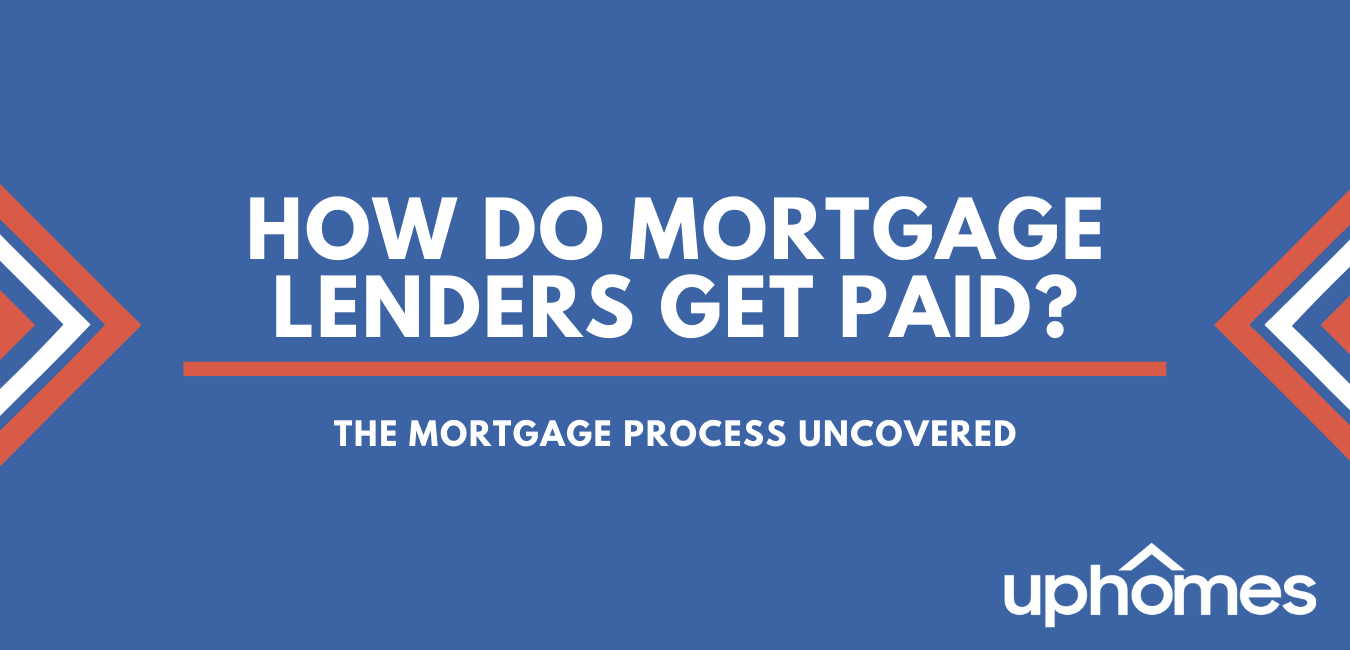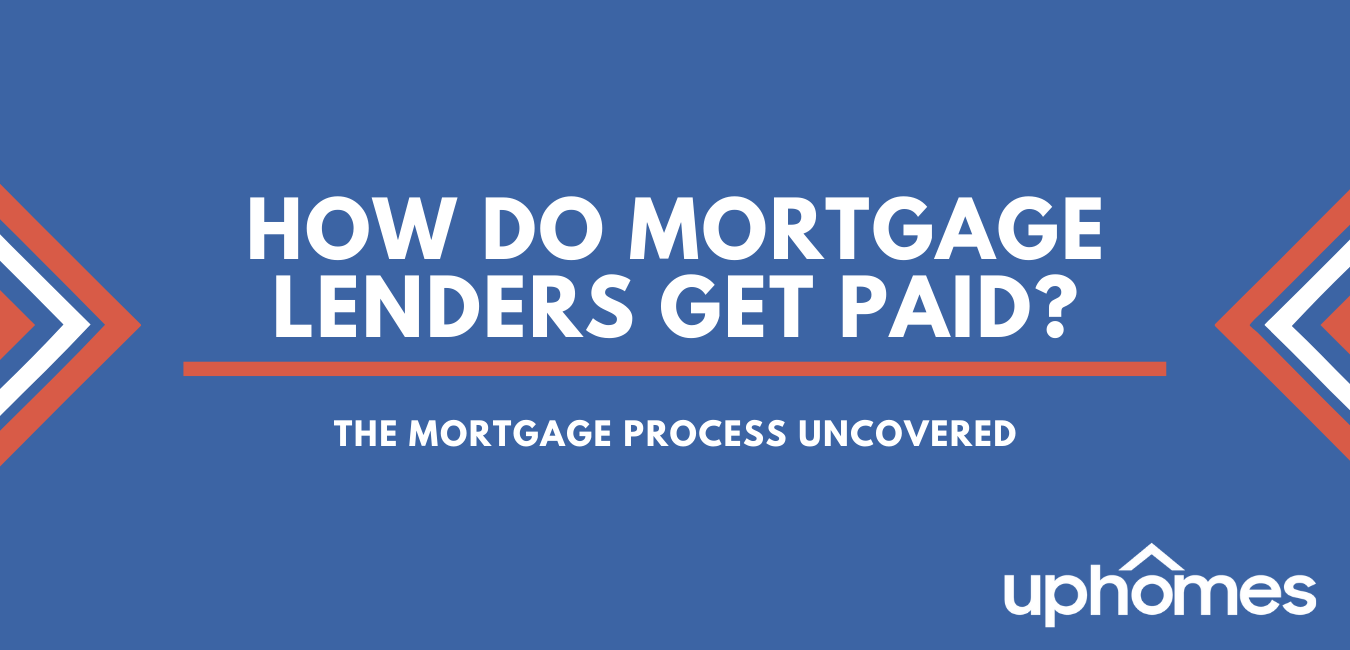November 19th, 2020

How Do Mortgage Lenders Make Money?

Have you ever wondered about the business of mortgages? More specifically how mortgage lenders make money? If you have, we will answer that question within this article though it may be a bit more complicated than what you may think on the surface! There's a lot that goes into helping buyers secure mortgages to buy homes.
Most mortgage lenders derive their pay from mortgage fees. However, that's not the only way they can make money. Being a mortgage lender is a lucrative opportunity for many, because of the nature of the back and front-end money streams.
In this article, we will cover everything you need to know about mortgage lenders and their approach to making money in a transaction, as well as the mortgage process step-by-step.
So if you'd like to know more about the realm of mortgages, keep reading.
Pre-Approval
The first and foremost step within the mortgage process is pre-approval. This process can be started by finding a local lender, using our website Uphomes.
Pre-approval is a necessary documented introduction from the lender that outlines if you can qualify for the loan for that period of time. It shows the sellers and agents that you are a real buyer. But it can also be useful in rabid markets in which sellers are considering many offers at the same time.
To become pre-approved, the lender will ask a series of questions and pull up your credit history. This report will consist of your past payment history, credit score, and credit accounts.
A lender can make use of this data to determine how much of the credit you can qualify for. Knowing this in advance will help you save time when you are looking for a home that you know is within your price range.
The Offer
With your pre-approval, it's time for you to check out some of the properties that you deem appropriate. Your agent will then help you understand which of these homes are a good match, and help you schedule some visits.
When you find the home, your agent will assist you in developing an offer. Your offer should detail how much of the earnest money you will put down with the offer, how much you want to finance, and your down payment.
The earnest deposit is usually 2% of the sales price. The funds will be released from escrow and then applied towards the payment during closing.
Offers can come with conditions, such as having the seller refinish the floors or have the inspections performed before sale.
If the offer has been completed, it becomes binding to both parties, so you have to be careful when signing it.
Loan Application
Now is the moment for you to actually apply for the loan. You can use any lender you like for this. In other words, you are not required to use the same lender that had pre-approved you.
It's also great if you can get several quotes. You can use our website to get some quotes. Lenders will often ask you about debt, assets, income, and employment.
Be prepared to provide your bank statements, as well as any of your tax reports, depending on your type of employment. You should be prepared to explain any issues on your credit histories, such as bankruptcy, bill payments, and collections.
You should have the causes, amounts, and dates prepared if these situations are mentioned. There might be several mortgages that fit your needs.
These can be adjustable-rate or fixed mortgages, government-issued, or convention. If you are applying for a veteran loan, you will need military service proof.
In any case, the lender should explain the best match for you, and provide a loan estimate. This should consist of interest rates, closing costs, monthly payments, etc.
Closing costs consist of prepaid expenses, settlement fees, taxes, and mortgage insurance. You have to get these estimates within 3 days of the application, as this is mandated by law.
Underwriting & Processing
When you decide to move forward, a lot will start to move around behind the scenes. The loan processors will gather information about you and the property, to develop a loan plan for an underwriter.
Underwriters are necessary when it comes to loan approval. They will ensure the accuracy of the data in the file and match your criteria and property type against the type of loan chosen.
Once everything has been assessed, the underwriter will reject or approve the loan. They might also choose to approve it under contingencies, such as explanations upon your collections or late payments.
Pre-Close
The lender will notify you if you have been approved or rejected. They will send the loan file to the attorney or title company so they can initiate the closing of the loan.
There is a lot of paperwork involved, but this should not concern you. The closing disclosure should be already familiar to you. It's the final version of the estimate, confirming the cost of the financing.
This document should match the loan estimate. By law, you have the right to assess this disclosure 3 days before the closure has occurred.
You're almost done. You will need to do a final inspection of the property at least 24 hours before closure to ensure that contractual repairs have been made. The home must be vacant and prepared for you to move in.
Loan Closure
Now all that is left between homeownership and you is the signing of documentation at closure. Be sure to bring all the necessary documentation and identification to close, and be prepared to spend several hours finishing it all up.
Don't rush and don't hesitate to ask questions if you have trouble understanding something.
Make sure that you review these:
- Promissory note (terms and loan amount)
- Closing disclosure (3 days before closure)
- Certificate of Occupancy (needed to move in)
- Deed of Trust (secures note, claim against you if you don't make payments)
You might need a cashier's check if the closing costs are not placed into the loan amount. A checkbook will be useful for any differences in the final and balance owed. In many scenarios, a bad lender will try to pull more money out of your pocket before closure happens.
How Do Mortgage Lenders Make Money?
Now that you understand the mortgage process, let's examine how do mortgage lenders make money. It might seem straightforward at first, but many of their money-making schematics are not transparent.
For instance, as the final phrases of the previous paragraph outlined, the fees might not be rolled into the loan amount, leaving you to pay them separately. In most cases, this is the fee that lenders make money on.
But that's not the only way that a lender can make money, so let's carry on.
Yield Spread Premium
A yield spread premium is a compensation that a lender/broker gets for the sale of interest rate in the loan that the person is taking on. Even though an agency presents itself as a lender, it might be an intermediary.
The YSP is usually used to cover costs that are related to the loan. It is the difference between the amounts charged and the amount that will be replaced with other financiers.
For instance, if the lender provides you with a rate of 3.5% for the loan but the interest rate is 4%, they will most likely keep 0.5%.
This percentage is variable and is defined by the lender who is interested in the transaction. You must understand this mechanism as a first step in knowing how do mortgage lenders make money.
Mortgage-Backed Security
This is an investment form that is similar to several bonds. It consists of a home loan that lenders buy from banks. Investors will get regular payments on these securities.
With the MBS, the bank is the intermediary between the agent and the investment industry. The investor will lend the money to the buyer while the investor gets some profit.
It's important to note that this MBS can be sold and bought via a broker. The question of minimum investment arises, but it's not certain.
It depends on the issuing party. The process works perfectly while everyone is doing what they have been outlined to do. If the mortgage is paid on time, the credit agency will do its job too.
An MBS should be issued by a government-sponsored enterprise, but they are often issued by private companies as well. This can make things quite confusing because in either case, the circumstances will be quite varied.
Service of Loan
The service of loan is connected to the administrative agency that the borrower will be noted until their loan is paid off. This means the borrower will make monthly payments and get payment statements, but also maintain a full record of the balances and payments.
The borrower can also get notified concerning insurance and taxes in the transaction. This is the main responsibility of banks because they are usually the ones providing the loan, so it's logical that they would be handling the service of a loan.
Once the mortgage begins to be injected into security, this process is less profitable. Nowadays, expectations are regularly changing.
With the advances in technology, the industry has become quite dependent on it. Nothing can be done without effective software anymore. All the information is integrated, enabling banks to get data fast and provide loans as fast as possible.
The lender will often take out a fee for these services if the bank does not provide them. However, this is only happening if you constitute taking out a loan that is not government-backed or secured by a recognized institution.
Fees on Loan Closure
As mentioned earlier, a lender will charge a fee to the borrower at closure. The underwriting fee, processing fee, application fee, origination fee, and lock fee are all potentially charged. All of these are acquired by the lender.
However, for instance, the origination fee might go to a loan officer instead. Junk fees don't really have purposes and are developed purely for profit.
Each lender has their own fees, and they should be vividly recognized in the Estimate of Good Faith. If they are not listed, then there's something very vicious going on, and it's time for you to consult with a lawyer and potentially pull out.
Points on Discount
A point of discount is a part of a loan amount that was charged before closing, and it was used to bring down interest rates on the mortgage.
A lender might take a small YSP on an interest rate and make up the difference via a discount point.
A discount point is equal to 1% of the amount, and it usually purchases a reduction of 0.25% on the interest. This profit type for lenders is also advantageous to you because the more they make, the less you will have to pay in the long run.
Mortgage Assistance for You
Now that you have discovered how do mortgage lenders make money, you can finally rest easy knowing that you are not taken advantage of. But even if they attempt to catch you off the hook, you can apprehend your lender and bring attention to their schematics in bad faith.
In any case, it's best that you consult with your attorney before you make any harsh decisions. All financial mechanisms and incentives should be considered from all sides.
Even if somebody is trying to implicate a couple of percent of profit for themselves, is it really worth losing this great property over the principle of someone not making a couple of dollars?
If you're looking for an appropriate mortgage that is befitting of your standards and needs, get in touch with us and we will happily accommodate you in the home buying process.

Ryan Fitzgerald
Hi there! My name is Ryan Fitzgerald, and I am a REALTOR®. My goal is to help you learn more about real estate through our Real Estate Blog! Hopefully, you enjoyed the above blog post and it found a way to provide help or value to you. When you're ready to buy or sell a home of your own let us know here. Please feel free to join the conversation by dropping us a comment below.

